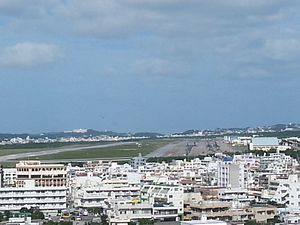After doggedly pushing forward with the Marine Corps Air Station Futenma relocation plan for years, last week, Japanese Prime Minister Shinzo Abe took the politically prudent step of settling three upcoming lawsuits out-of-court. According to the terms of the settlement, Abe halted the controversial and unpopular land reclamation work off the Henoko coast, the planned location for the Futenma relocation facility. The central government and Okinawa will now head back to the negotiating table to see if they can work out a compromise.
The United States and Japan have been working on resettling the Futenma base away from Ginowan since 1996, when the U.S. agreed to move Futenma when Tokyo built an alternative facility. The United States and Japan agreed to move the base to Henoko in 2006, despite local opposition.
The current plan is extremely unpopular among Okinawans, who want to see the base removed altogether, rather than relocated to another part of the island. Okinawan Governor Takeshi Onaga has been fighting the plan as he promised prior to his election in December 2014, even taking the central government to court over the issue.
The current settlement consolidates the three legal battles pending between Tokyo and the Okinawa Prefectural Government – over whether construction work at Henoko should continue or not – into just one suit and requires both parties to abide by the future ruling should they proceed to court. Hypothetically, the three lawsuits could be dropped entirely if discussions are productive; however, most observers remain skeptical about the central and prefectural government reaching an agreement.
Even insiders were caught off guard by the central government’s relatively sudden shift to dialogue with the prefectural government. Abe accepted the proposal because he was concerned that relocation might get stuck in permanent gridlock if the legal battle between the central and prefectural government continued to drag on.
Another important factor contributing to this surprising outcome is the ruling Liberal Democratic Party’s (LDP) concern about a rigid position on the Futenma base relocation plan negatively affecting their performance in the Upper House elections this summer. The upcoming elections, which could become a double election should Abe choose to dissolve the Lower House, are critical for Abe to achieve his lifelong dream of constitutional revision.
Because Abe is widely perceived to be a security hawk, it makes sense that efforts are being made to moderate his government’s image – especially in Okinawa, which suffered the most in World War II. In another example that demonstrates how far the LDP is willing to go to show consideration for Okinawans’ feelings, earlier discussions proposed extending the official campaign period so that campaigning would not begin on June 23, Okinawa Memorial Day. Okinawa Memorial Day commemorates Japanese lives lost in the fighting on Okinawa, and is a day of mourning; party leaders did not want to juxtapose the celebratory atmosphere of electioneering with the somber mood of Okinawan suffering.
But such “consideration” will only go so far. As Abe told reporters, “Our [the Japanese government’s] position that the relocation to Henoko is the only option remains unchanged.” The United States responded to this settlement by also reaffirming their commitment to the relocation.
Though this agreement has given the LDP “breathing room” to put the issue on the back burner until after the summer elections, the pause will only last a year at most.
Admiral Harry Harris, head of the U.S. Pacific Command, recently testified that the move had been delayed by “a little over two years.” Chief Cabinet Secretary Yoshihide Suga also conceded that even if everything went smoothly from here on out, the replacement facility will not be completed by 2020.
Though the United States is unwilling to give up their base on Okinawa, military and political leaders are doing their best to reduce the burden on local Okinawans. For example, the process of returning lands to Japan has been expedited. Furthermore, General Robert Neller, commandant of the U.S. Marine Corps, reaffirmed that “there is a political decision that says the number of Marines is going to be reduced on the island of Okinawa, and so we are still committed to support that and do our part to make that happen.”

































